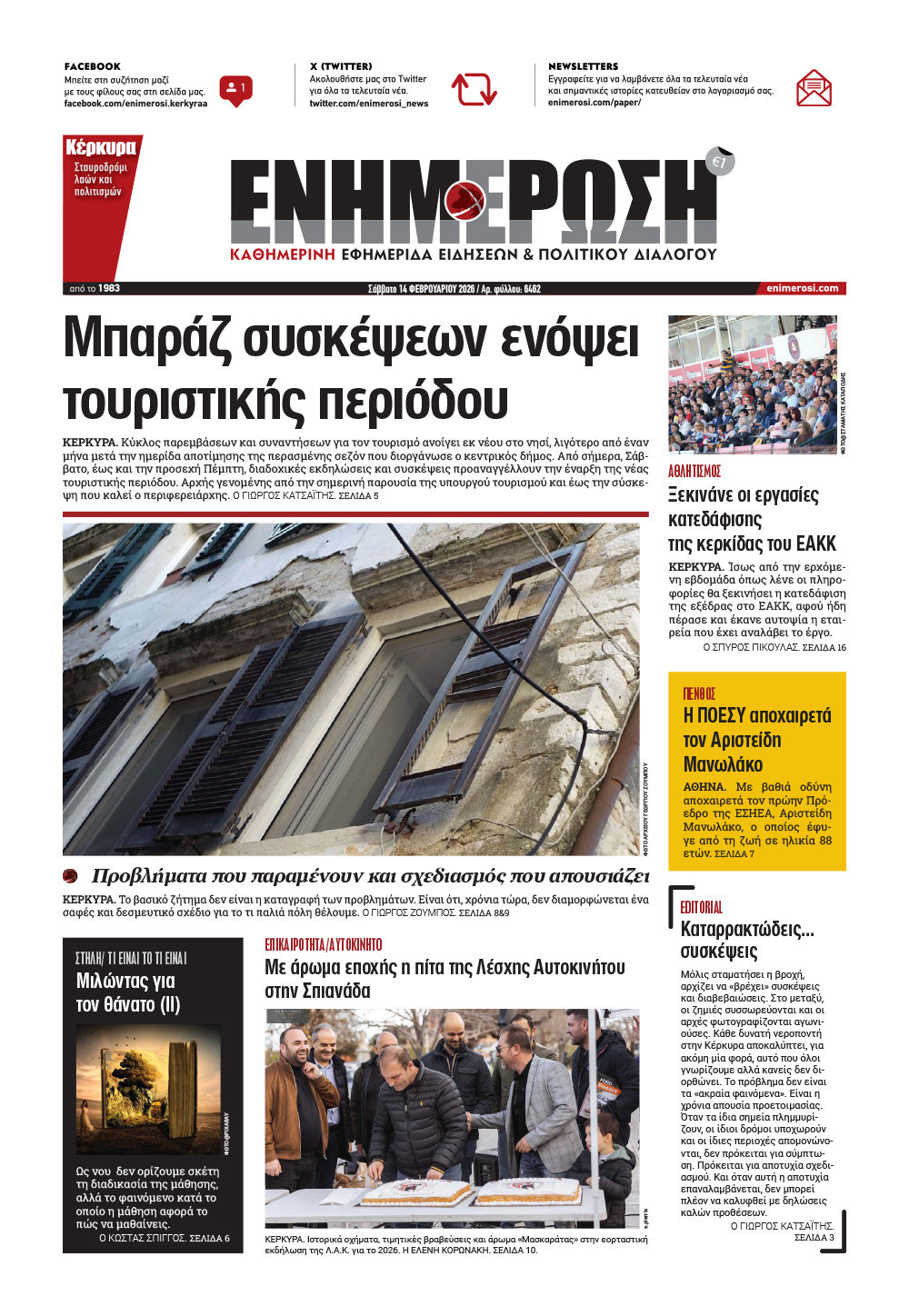Implementation of door-to-door glass collection in North Corfu Municipality

Theodoros Voros
04 Aug 2022
/ 23:03
Results for May-June 2022 – Advantages and benefits.
The implementation of door-to-door separate collection systems for recyclable materials is always interesting. The collection is done at the doors of businesses that produce this type of waste. With the separate collection, the possibility of one material being mixed with the others is minimised and therefore a material purity of more than 98% is achieved.
The quantities of the green bin's mixed waste are also being reduced, while in many municipalities that follow this model it is being observed that the need for bins in public areas is minimised or even eliminated. A recent example is that of the Tilos Municipality, which implemented a zero waste programme and within 5 months the bins in public areas belonged to the past.
Based on international examples, some key advantages of developing door-to-door systems are the following:
1) No bins on the streets (more public space available, less problems with bins that are being moved or disappear, etc.)
2) All businessowners are being informed in person and the waste is being collected by each one of them. The responsibility is not anonymous.
3) Better qualitative and quantitative results and a small reduction in waste produced due to less non-municipal waste ending up in bins. Waste collection time may increase up to 10%, but this extra time is basically distributed across all streams and thus the collection time of green bins' mixed waste is also being reduced. The routes made by refuse trucks are eventually also being reduced, thus saving on management costs.
4) No more money spent on maintaining the bins on the streets or buying new ones.
5) It is a labour-intensive model that is focused on the person in whom it invests and trains. A good ratio based on international examples is 1 cleaner per 240 residents (e.g. Vienna, Seveso etc.). This model also has a reduced need for large, expensive and "heavy" management facilities which are unwanted. Thus, initial investment costs are saved and maintenance and operating costs are reduced.
6) Reduction of waste which benefits the municipality as it is saving the transportation and landfill costs, as well as the landfill tax.
7) Low levels of non-recyclable materials in the recyclable waste streams, which lead to reduced management costs.
8) Potential increase in revenue from selling the recovered recyclable materials due to their high purity (certified material purity of over 99% in green spots).
9) Finally, the implementation of door-to-door collection systems can be an excellent example for the implementation of the 'Pay as you throw' and 'Earn as you recycle' systems.

As shown in Table 1 with the quantities of mixed waste, recycled waste and total urban solid waste, the recycling rate for May-June is for the first time at 12.8%, when in January-April it was 7.4%, while the recycling rate for January-June is 10%.

The Table 2a, with the quantitative data on recyclables by material, shows that from January to April, 8.69% of the total recyclables was glass, while from May to June it was 31.65% and from January to June it was 25.03%.

In Table 2b one can see that there is a 81,56% increase of the collection of recyclable materials in January-June by the North Corfu Municipality with an increase in quantities of all recyclable materials, a 12,9% decline of the quantities collected by the Social Cooperative Enterprise (KOINSEP) SynPraxis, while overall in June there was an increase in the quantity of recyclables by 49,72%.

According to Table 3, 41.5% of all recyclables in June was glass, when it was at 3.6% in April and 27.3% in May, while there was an increase in the total production of municipal solid waste from 0.28% in April to 5.11% in June. The North Corfu Municipality announced that from 3 May 2022, door-to-door collection would start from businesses, from which there was great and immediate response to participate in this programme. This can also be seen from the table's data, as the quantities of glass collected increased from 2.45 tons in April to 38.15 tons in May and 75.42 tons in June - a very important and promising result with a high speed of implementation.
A benefit that arises from each ton recycled in the North Corfu Municipality is that the latter saves the transportation costs from Corfu to the Palairos landfill, where the municipality is forced to transport the waste, as well as the Palairos gate fee and the landfill fee (about €200/ton in total). This is a cost from which the municipality is exempted and there is therefore a strong incentive for it to wish to increase the quantities of recyclables instead of the very expensive and very bad for the environment production of mixed waste.
The very positive results of the period May-June are a clear indication of both the municipality's willingness to implement the door-to-door collection system and the businesses' great willingness to participate. The data clearly confirm, as expected, the validity and effectiveness of the choice of the door-to-door collection system. It is expected that this model will be later applied to the collection of organic materials and thus it is expected that recycling rates will increase considerably.
Another benefit is the money saved from not transporting the residues and mixed waste to Kozani landfill.
From May to June, the transportation cost to Palairos landfill, the gate fee and the landfill fee were saved (75.42+38.5 = 114 tons x €200/ton = €22,800), while there was also a benefit from a subsidy (€150/ton x 114 tons x 46% = 7,866€).
In some simple ways, our lives can be significantly changed for the better and we can answer with confidence to the dilemma of municipal bankruptcy or recycling. We are choosing LIFE by giving a second life to recyclable materials and therefore saying without a second thought YES TO RECYCLING, especially if we are referring to the door-to-door system and even more so if this method is accompanied by financial incentives and disincentives.
All the abovementioned observations are strong evidence of the great potential that the door-to-door collection system has and confirm the conclusions drawn from international practice, i.e. the possibility of fast implementation speed and immediate results while reducing management costs.
It is worth noting that the Ministry of Environment organised a workshop in Athens in June 2019, with invited speakers from many European municipalities and the participation of representatives of the then single Corfu Municipality and a large number of representatives of other Greek municipalities. The conclusion was that the door-to-door system is by far the best and most effective in terms of collecting high purity recyclable materials to achieve high recycling and recovery rates set by the European directives for the circular economy.
By Theodoros Voros, Economist & MSc Statistician
The quantities of the green bin's mixed waste are also being reduced, while in many municipalities that follow this model it is being observed that the need for bins in public areas is minimised or even eliminated. A recent example is that of the Tilos Municipality, which implemented a zero waste programme and within 5 months the bins in public areas belonged to the past.
Based on international examples, some key advantages of developing door-to-door systems are the following:
1) No bins on the streets (more public space available, less problems with bins that are being moved or disappear, etc.)
2) All businessowners are being informed in person and the waste is being collected by each one of them. The responsibility is not anonymous.
3) Better qualitative and quantitative results and a small reduction in waste produced due to less non-municipal waste ending up in bins. Waste collection time may increase up to 10%, but this extra time is basically distributed across all streams and thus the collection time of green bins' mixed waste is also being reduced. The routes made by refuse trucks are eventually also being reduced, thus saving on management costs.
4) No more money spent on maintaining the bins on the streets or buying new ones.
5) It is a labour-intensive model that is focused on the person in whom it invests and trains. A good ratio based on international examples is 1 cleaner per 240 residents (e.g. Vienna, Seveso etc.). This model also has a reduced need for large, expensive and "heavy" management facilities which are unwanted. Thus, initial investment costs are saved and maintenance and operating costs are reduced.
6) Reduction of waste which benefits the municipality as it is saving the transportation and landfill costs, as well as the landfill tax.
7) Low levels of non-recyclable materials in the recyclable waste streams, which lead to reduced management costs.
8) Potential increase in revenue from selling the recovered recyclable materials due to their high purity (certified material purity of over 99% in green spots).
9) Finally, the implementation of door-to-door collection systems can be an excellent example for the implementation of the 'Pay as you throw' and 'Earn as you recycle' systems.

As shown in Table 1 with the quantities of mixed waste, recycled waste and total urban solid waste, the recycling rate for May-June is for the first time at 12.8%, when in January-April it was 7.4%, while the recycling rate for January-June is 10%.

The Table 2a, with the quantitative data on recyclables by material, shows that from January to April, 8.69% of the total recyclables was glass, while from May to June it was 31.65% and from January to June it was 25.03%.

In Table 2b one can see that there is a 81,56% increase of the collection of recyclable materials in January-June by the North Corfu Municipality with an increase in quantities of all recyclable materials, a 12,9% decline of the quantities collected by the Social Cooperative Enterprise (KOINSEP) SynPraxis, while overall in June there was an increase in the quantity of recyclables by 49,72%.

According to Table 3, 41.5% of all recyclables in June was glass, when it was at 3.6% in April and 27.3% in May, while there was an increase in the total production of municipal solid waste from 0.28% in April to 5.11% in June. The North Corfu Municipality announced that from 3 May 2022, door-to-door collection would start from businesses, from which there was great and immediate response to participate in this programme. This can also be seen from the table's data, as the quantities of glass collected increased from 2.45 tons in April to 38.15 tons in May and 75.42 tons in June - a very important and promising result with a high speed of implementation.
A benefit that arises from each ton recycled in the North Corfu Municipality is that the latter saves the transportation costs from Corfu to the Palairos landfill, where the municipality is forced to transport the waste, as well as the Palairos gate fee and the landfill fee (about €200/ton in total). This is a cost from which the municipality is exempted and there is therefore a strong incentive for it to wish to increase the quantities of recyclables instead of the very expensive and very bad for the environment production of mixed waste.
The very positive results of the period May-June are a clear indication of both the municipality's willingness to implement the door-to-door collection system and the businesses' great willingness to participate. The data clearly confirm, as expected, the validity and effectiveness of the choice of the door-to-door collection system. It is expected that this model will be later applied to the collection of organic materials and thus it is expected that recycling rates will increase considerably.
Another benefit is the money saved from not transporting the residues and mixed waste to Kozani landfill.
From May to June, the transportation cost to Palairos landfill, the gate fee and the landfill fee were saved (75.42+38.5 = 114 tons x €200/ton = €22,800), while there was also a benefit from a subsidy (€150/ton x 114 tons x 46% = 7,866€).
In some simple ways, our lives can be significantly changed for the better and we can answer with confidence to the dilemma of municipal bankruptcy or recycling. We are choosing LIFE by giving a second life to recyclable materials and therefore saying without a second thought YES TO RECYCLING, especially if we are referring to the door-to-door system and even more so if this method is accompanied by financial incentives and disincentives.
All the abovementioned observations are strong evidence of the great potential that the door-to-door collection system has and confirm the conclusions drawn from international practice, i.e. the possibility of fast implementation speed and immediate results while reducing management costs.
It is worth noting that the Ministry of Environment organised a workshop in Athens in June 2019, with invited speakers from many European municipalities and the participation of representatives of the then single Corfu Municipality and a large number of representatives of other Greek municipalities. The conclusion was that the door-to-door system is by far the best and most effective in terms of collecting high purity recyclable materials to achieve high recycling and recovery rates set by the European directives for the circular economy.
By Theodoros Voros, Economist & MSc Statistician





